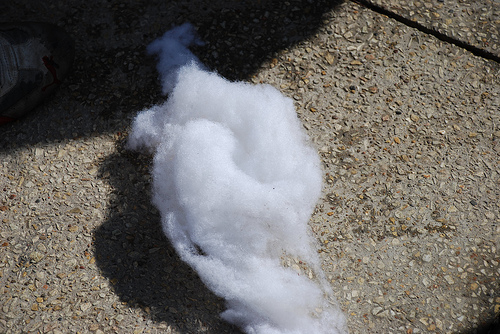
Conventional polyfill is petroleum based, so what’s a green crafter to do? Here are some eco-friendlier options for stuffing that pillow or plushie!
We talked yesterday about how to make a pillow without buying petroleum-based polyfill. Bits of thread and tiny fabric scraps are great for some projects, but like I mentioned in that tutorial, they can leave things on the lumpy side. A few lumps are fine if you’re making something just for you or a friend, but there are times that you want your finished project to come out a bit more evenly.
1. Stuff with Scraps
One solution is to combine your scraps with another stuffing material, maybe one part scraps to two parts other stuffing. The problem is: what other stuffing? Sure, you could pick up a bag of the conventional stuff at the fabric store, but it’s essentially fluffy plastic, and what green crafter wants to buy plastic, right? Here are a couple of polyfill alternatives, along with their pros and cons.
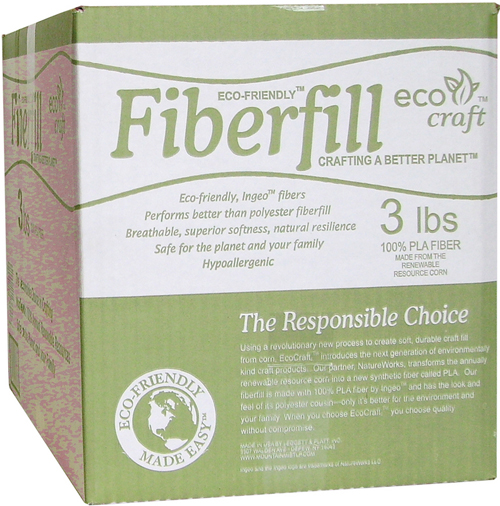
2 & 3 Corn or Soy Fiber Fill
You can find corn- or soy-based polyfill alternatives online, and these are slightly better than their petroleum-based cousin. There are still a lot of chemicals involved in turning plants into stuffing, but at least you’re starting out with a natural material.
The other issue with corn and soy is that unless they’re organic, they are most likely genetically modified. If you feel strongly about not supporting big biotech firms like Monsanto, corn and soy products are not the greenest choice.
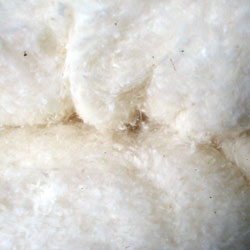
4. Organic Cotton Stuffing
Organic cotton stuffing is a bit pricier than corn and soy fiber fills, but it’s by far the greenest option out there. I’ve ordered organic cotton stuffing from Near Sea Naturals before and was very happy with it! It’s a bit denser than more processed fiber fills, so your project will have a bit more weight to it when it’s finished. They sell their stuffing by the pound, and a one pound box stuffed two smallish throw pillows. For one standard-sized pillow, they recommend two pounds of stuffing.
Have you found petroleum-free fiber fills that you like? I’d love to hear about other options in the comments!
Image Credits: Creative Commons photo by Guitarfool5931, Hancock Fabric, Near Sea Naturals


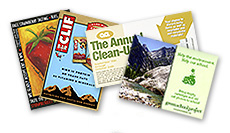
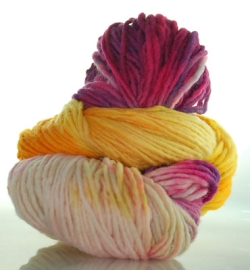
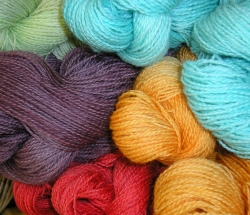

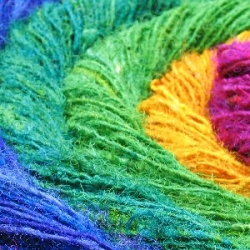
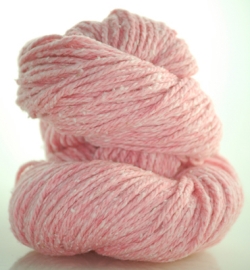

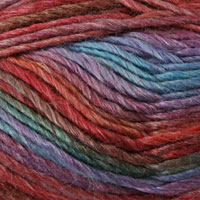
Good post 🙂 I like to use Kapok when I can find it. It is similar in silkiness to the fluff that comes from milkweed pods (we used to have them in our backyard), though I expect you would need a lot of milkweed plants to have enough stuffing from that! I also like to combine fabric scraps which I sort of put in the centre of what I’m stuffing and wrap the regular stuffing around so it’s not too lumpy–just hate throwing those scraps out so I have several bags of the stuff just waiting to stuff something!
I crochet little stuffed animals and often just use organic cotton balls since they are really small but that wouldn’t work well for larger items.
I much agree with Tovah A, I also use Kapok stuffing mixed with lightweight cotton scraps (or sometimes merino wool leftover from felting, although only if it’s for someone who’s ok with animal-derived things, of course).
Thankyou so much for this post, this is an area I had some trouble in before I found these plant-based fibres – because I craft some historical outfitting, I had to find something to stuff Victorian bustle pads with (check them out here if you’re not sure what I’m talking about! : http://www.gaia-noir.co.uk/index.php?main_page=product_info&products_id=204&zenid=a8ad7718ad20959140b6fcf737a2dcb5 ).
It was difficult, because the bustle pad had to be light enough to wear around the waist, under a skirt, but fluffy enough to support heavy velvet fabrics. However, a costumer friend reckoned that the Victorians themselves sometimes used kapok (as they didn’t exactly have petrochemical synthetic stuffing), so not only is it beautifully fluffy, it’s more authentic anyway! 🙂
I much agree with Tovah A, I also use Kapok stuffing mixed with lightweight cotton scraps (or sometimes merino wool leftover from felting, although only if it’s for someone who’s ok with animal-derived things, of course).
Thankyou so much for this post, this is an area I had some trouble in before I found these plant-based fibres – because I craft some historical outfitting, I had to find something to stuff Victorian bustle pads with (check them out here if you’re not sure what I’m talking about! : http://www.gaia-noir.co.uk/index.php?main_page=product_info&products_id=204&zenid=a8ad7718ad20959140b6fcf737a2dcb5 ).
It was difficult, because the bustle pad had to be light enough to wear around the waist, under a skirt, but fluffy enough to support heavy velvet fabrics. However, a costumer friend reckoned that the Victorians themselves sometimes used kapok (as they didn’t exactly have petrochemical synthetic stuffing), so not only is it beautifully fluffy, it’s more authentic anyway! 🙂
Buying and using wool products demands and rewards tremendous animal cruelty, torture and exploitation. To learn more, check the facebook page PLEDGE TO GO WOOL-FREE.
We forgo any polyfill products for our dog toys secondary what we call the “chew factor”– no being should chew on petrochemicals in any form, reprocessed or otherwise. So.. we use organic cotton batting but we also use agave fiber we get from envirotextiles. It is bit scrunchy and this makes it harder to compact and it has real body. We mix it with the cotton batting and works perfectly for many of our dog toys. Contact them for additional info. Here is their page on agave fiber: http://envirotextile.com/agave-products/index.html
I’ve had success stuffing very small projects with dryer lint. Since my husband works on a farm, I actually have to comb it first so that it is not filled with straw and chaff. Has anybody else tried this for larger projects?
great idea!! I should have sAVED THEM ALL!!
I use shredded/cut up old t-shirts.
Half the time “green” alternatives are even worse than the evil thing they’re replacing which is causing growing suspician of the whole green fad. Besides that, a lot of people just don’t give a s%&t.
I have always wondered what people thought of dog toys with or without polyfill. I adopted a little Maltese dog a couple of years ago and he doesn’t really play with dog toys. I started making dog clothes for him and then everyone loved the dog clothes and pet apparel so I have also purchased and made dog toys, with and without the filling.
My thought is that it could make them choke if they are aggressive chewers and ingest the material, which I can’t imagine is good.
Pingback: How to Make Pillows: A DIY Pep Talk for the Pillow Lover : EcoSalon | Conscious Culture and Fashion
abut cotton filling–i’ve heard by some that cotton filling isn’t a good choice because it compacts, doesn’t spring back, and clumps when washed. has anyone had experience with this?
I used cotton batting in a quilted baby blanket for my son and haven’t had that problem. I think that if I hadn’t quilted it, it may have begun clumping, though.
Thanks Becky! Your article really helped me in my search of a more eco-friendly alternative for rag doll filling.